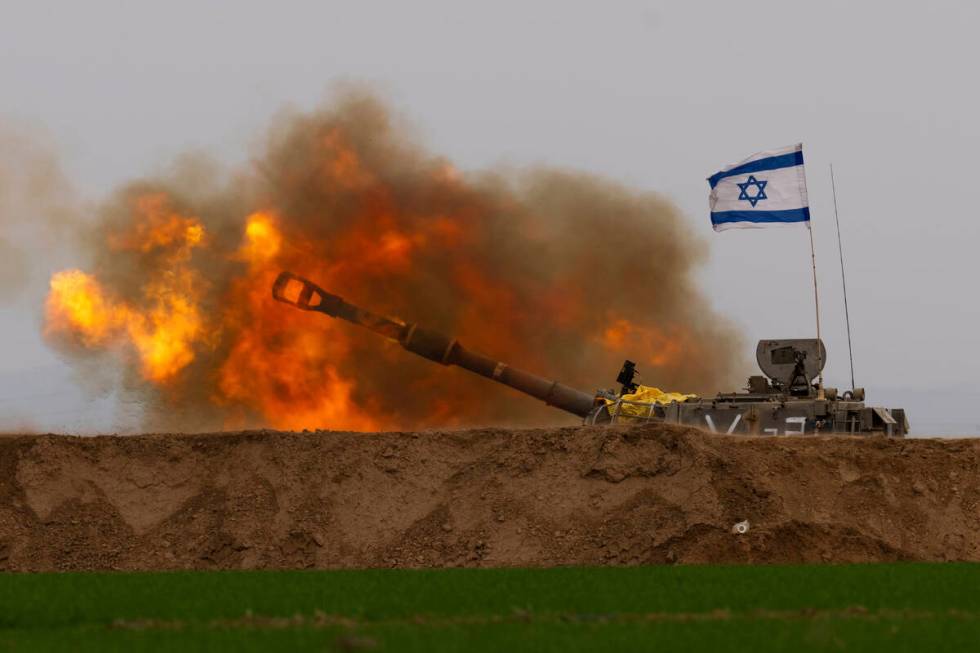Israel expands ground war against Hamas

RAFAH, Gaza Strip — The Israeli military is sending more ground forces, including combat engineers, to Khan Younis to target Hamas terrorists above ground and in tunnels. On Friday, it ordered tens of thousands of residents to leave their homes in Burej, an urban refugee camp, and surrounding communities, also in the south.
The military has said that months of fighting lie ahead in southern Gaza.
The air and ground campaign also continued in the north, even as Israel says it is in the final stages of clearing out Hamas terrorists there.
Israel has vowed to continue the war until Hamas is removed from power in Gaza and all the hostages taken during its Oct. 7 cross-border attack are freed.
Israel, shielded by the United States, has resisted international pressure to scale back its offensive and has said it would press on until Hamas, the terrorist group that has ruled Gaza for 16 years, has been destroyed.
Israel declared war after Hamas terrorists stormed across its border and killed some 1,200 people and kidnapped 240 others. Israel’s military says 139 of its soldiers have been killed in the ground offensive. It says it has killed thousands of Hamas terrorists, including about 2,000 in the past three weeks.
Gaza’s Health Ministry said Friday that it has documented 20,057 deaths in the fighting and more than 50,000 wounded. It does not differentiate between combatant and civilian deaths.
Israel blames Hamas for the high civilian death toll, citing the group’s use of crowded residential areas for military purposes.
Meanwhile, phone and internet services were gradually being restored late Thursday, after the latest communications blackout of 35 hours.
Repeated cuts in communications have hampered aid deliveries.
More than half a million people in Gaza — a quarter of the population — are starving, according to a report Thursday from the United Nations and other agencies.
An Israeli liaison officer said there is no food shortage in Gaza, saying sufficient aid is getting through.
“The reserves in Gaza Strip are sufficient for the near term,” Col. Moshe Tetro, a defense official, said from the Kerem Shalom cargo crossing, opened by Israel several days ago amid international demands to improve the flow of aid.
After many delays, the U.N. Security Council adopted a resolution Friday calling for immediately speeding up aid deliveries to civilians in Gaza.
The United States won the removal of a tougher call for an “urgent suspension of hostilities” between Israel and Hamas. It abstained in the vote, as did Russia, which wanted the stronger language.
The resolution was the first on the war to make it through the council after the U.S. vetoed two earlier ones calling for humanitarian pauses and a full cease-fire.
The U.S. also negotiated the removal of language that would have given the U.N. authority to inspect aid going into Gaza, something Israel says it must do to ensure material does not reach Hamas terrorists.
Israel’s ambassador to the U.N., Gilad Erdan, thanked the U.S. for its support and sharply criticized the U.N. for its failure to condemn Hamas’ Oct. 7 attacks. The U.S. vetoed a resolution in October that would have included a condemnation because it didn’t also underline Israel’s right to self-defense.
Hamas said in a statement that the U.N. resolution should have demanded an immediate halt to Israel’s offensive, and it blamed the United States for pushing “to empty the resolution of its essence” before Friday’s Security Council vote.
U.N. Secretary-General António Guterres, meanwhile, reiterated his longstanding call for a humanitarian cease-fire.
Guterres said nothing can justify Hamas’ Oct. 7 attacks, its taking of hostages, its rocket launches against Israel and what he called its use of civilians as human shields.
“But at the same time, these violations of international humanitarian law can never justify the collective punishment of the Palestinian people, and they do not free Israel from its own legal obligations under international law,” the secretary-general said.
———
Magdy reported from Cairo. Associated Press writer Edith M. Lederer at the United Nations contributed.